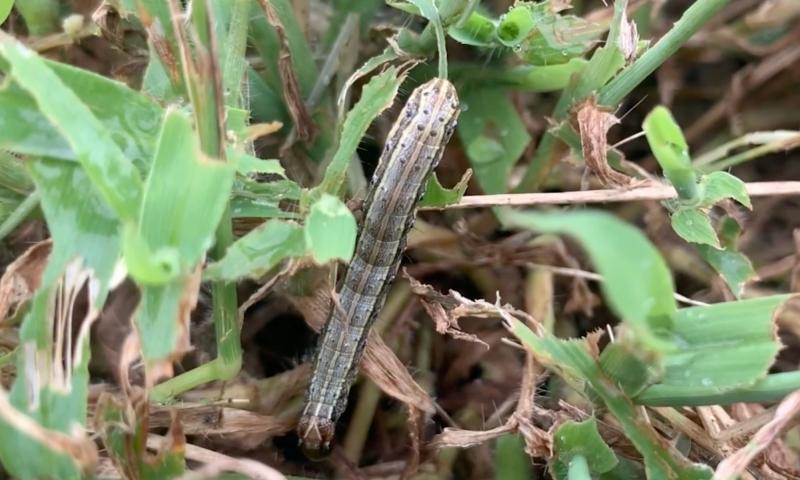A local entomologist with the University of Tennessee Institute of Agriculture has received numerous reports of fall armyworms in Tennessee. Despite their growing presence in the state as they migrate north, concerns should remain low about their impact on local lawns and row crop farms.
Sebe Brown, Extension specialist and researcher in the UT Department of Entomology and Plant Pathology, says armyworms are currently only being reported in pasture grasses such as hay. Although their population is already larger than last year, armyworm estimates remain significantly lower than in 2021 when the pests consumed row crops as well as turfgrass varieties.
"We are just not seeing the numbers like we did a couple seasons ago. Yes, they are present in Tennessee, but the current trends are nowhere reflective of what we have seen in the past. It is important that homeowners are aware but react appropriately," says Brown.
While treatment options are sold at lawn and garden stores, Brown says these solutions are not preventative measures and should only be applied if worms are already present. "These products have limited residual efficiency. Meaning if you use them when no worms are around, it will not keep them from getting in your yard and will provide limited long-term protection. The most effective way to treat armyworms is to apply only when they show up."
Homeowners are encouraged to "scout" their lawn, a process farmers use to identify plant diseases, harmful insects and pests in row crops. Once a day, homeowners should walk their lawn and look for indications of armyworms, such as dead patches where they have eaten and large numbers of birds that might have gathered to feed on the worms.
Brown says farmers should also regularly scout their hay pastures to ensure end-of-year profitability remains unaffected. "Signs such as flocks of birds often mean the worms have already gathered in large numbers, so yield loss might have already occurred. Scouting should be done regularly, checking for both armyworms and other seasonal pests."
The armyworm is the caterpillar of the fall armyworm moth and feeds primarily on grass, fresh sod, hay fields and, on rare occasion, summer and fall crops. An armyworm's life span is about twelve days, with the last couple of days being the period when they eat the most. Despite few reports of damage to lawns and row crop farms this season, Brown says residents still need to take action if they are identified.
"To protect your property, we highly encourage treating as soon as you know they are there. Products are available at most home improvement retailers, garden centers and agriculture supply stores, but make sure to only apply according to label. With proper scouting and treatment, armyworms can be safely and effectively managed whether at your farm, home or business."
For more information on armyworms and treatment options, please contact your local county Extension office.







